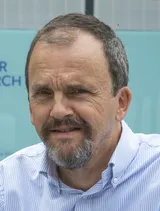Special Seminar by Prof. Kevin Brindle: Imaging tumour metabolic subtypes and their responses to treatment
Events |

Date: Tuesday, April 8, 2025, 13:00-14:00 PM, coffee and tea afterwards
Venue: Johannes B. Ortner Forum (small auditorium on the left) at the TranslaTUM (Einsteinstr. 25, 81675 München)
Speaker: Kevin M. Brindle (Hans Fischer Senior Fellow), Cancer Research UK Cambridge Institute, University of Cambridge
Abstract: Molecular imaging is likely to play an increasingly important role in predicting and detecting tumour responses to treatment and thus in guiding treatment in individual patients. We have been using MRI-based metabolic imaging techniques to detect tumour treatment response, to monitor disease progression and to investigate the tumour microenvironment. Initially this was using hyperpolarized 13C-labelled substrates. Nuclear spin hyperpolarization increases sensitivity in the 13C magnetic resonance experiment by >10,000x, which allows imaging of injected hyperpolarized 13C labelled cell substrates in vivo and, more importantly, the kinetics of their metabolic conversion into other cell metabolites. More recently we have been using 2H-labelled substrates; the relatively low sensitivity of detection is compensated by the very short T1s displayed by this quadrupolar nucleus, which enables extensive signal averaging in the absence of signal saturation. Both imaging techniques have translated to the clinic. In this talk I will describe recent studies in which we have used these techniques to distinguish tumour metabolic subtypes, which has prognostic information, and to detect their early responses to treatment.
Kevin Brindle received his BA in Biochemistry from Oxford University in 1978. In 1982 he completed his D.Phil, also at Oxford University, on “Proton NMR studies of intact cells”. From 1983 to 1990 he worked as a postdoctoral fellow at the University of Oxford. He was awarded a Royal Society Research Fellowship in 1986. In 1990 he moved to the University of Manchester, where he took up a lectureship in 1991. Since 1993 he has worked at the University of Cambridge, where he was appointed professor in 2005. He has a joint appointment with the University of Cambridge and the Cancer Research UK Cambridge Institute. Since 2024, he has been a TUM-IAS Hans Fischer Senior Fellow at the Institute of Advanced Study hosted by and working closely with the Department of Nuclear Medicine at TUM University Hospital.